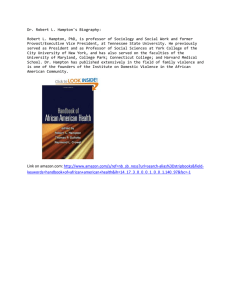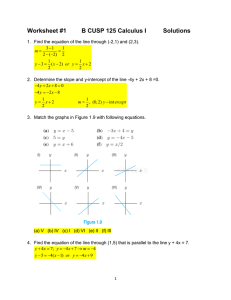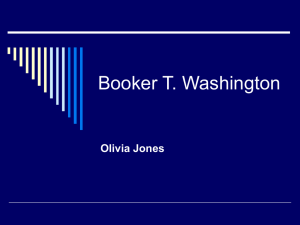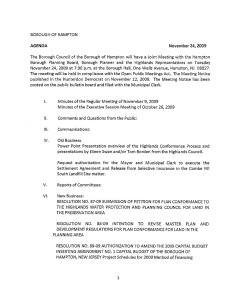Hampton University HIS 107 Syllabus: African-American History
advertisement
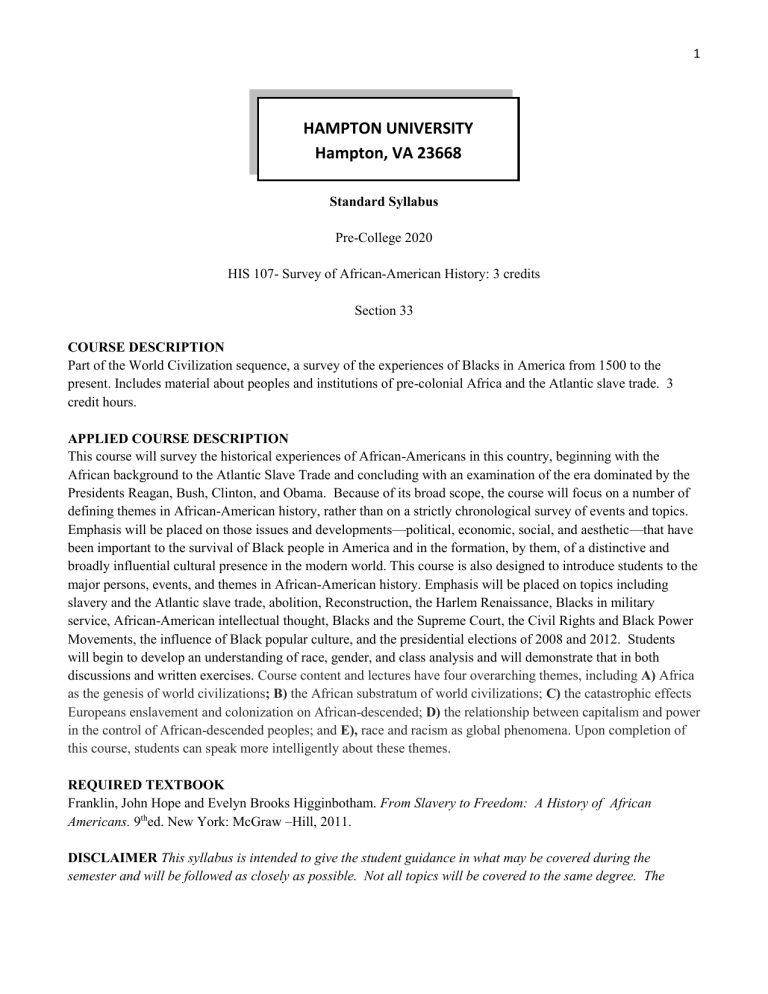
1 HAMPTON UNIVERSITY Hampton, VA 23668 Standard Syllabus Pre-College 2020 HIS 107- Survey of African-American History: 3 credits Section 33 COURSE DESCRIPTION Part of the World Civilization sequence, a survey of the experiences of Blacks in America from 1500 to the present. Includes material about peoples and institutions of pre-colonial Africa and the Atlantic slave trade. 3 credit hours. APPLIED COURSE DESCRIPTION This course will survey the historical experiences of African-Americans in this country, beginning with the African background to the Atlantic Slave Trade and concluding with an examination of the era dominated by the Presidents Reagan, Bush, Clinton, and Obama. Because of its broad scope, the course will focus on a number of defining themes in African-American history, rather than on a strictly chronological survey of events and topics. Emphasis will be placed on those issues and developments—political, economic, social, and aesthetic—that have been important to the survival of Black people in America and in the formation, by them, of a distinctive and broadly influential cultural presence in the modern world. This course is also designed to introduce students to the major persons, events, and themes in African-American history. Emphasis will be placed on topics including slavery and the Atlantic slave trade, abolition, Reconstruction, the Harlem Renaissance, Blacks in military service, African-American intellectual thought, Blacks and the Supreme Court, the Civil Rights and Black Power Movements, the influence of Black popular culture, and the presidential elections of 2008 and 2012. Students will begin to develop an understanding of race, gender, and class analysis and will demonstrate that in both discussions and written exercises. Course content and lectures have four overarching themes, including A) Africa as the genesis of world civilizations; B) the African substratum of world civilizations; C) the catastrophic effects Europeans enslavement and colonization on African-descended; D) the relationship between capitalism and power in the control of African-descended peoples; and E), race and racism as global phenomena. Upon completion of this course, students can speak more intelligently about these themes. REQUIRED TEXTBOOK Franklin, John Hope and Evelyn Brooks Higginbotham. From Slavery to Freedom: A History of African Americans. 9thed. New York: McGraw –Hill, 2011. DISCLAIMER This syllabus is intended to give the student guidance in what may be covered during the semester and will be followed as closely as possible. Not all topics will be covered to the same degree. The 2 professor reserves the right to modify, supplement, and make changes as the course needs arise. Any changes will be given to the student in writing, at which time the student will be bound by those modifications. HAMPTON UNIVERSITY GENERAL EDUCATION/CORE COMPETENCIES: In addition to the material covered relating to the course content, this course addresses the following Hampton University Core Competencies: 1. Critical Thinking: the ability to identify how to act after careful evaluation of the evidence and reasoning presented in communication, identification of ethical issues and application of ethical principles relating to personal, professional and academic contact. Measurement: a combination of individual and/or student group presentations on issues of national politics or movements or incidents within a nation or world crisis; also, demonstrating masterly of basic historical facts, concepts, themes, applying these to new, concrete and possible future situations and analysis (deduction, application of generalizations, principles, theories etc) to concepts. 2. Information and Technology Literacy is the ability to use electronic media to support research activities to locate, evaluate, and use effectively the needed information and its sources. Measurement: competence in the application, use and manipulation of traditional information and technology sources (libraries, internet, social media) to identify, find, research, collate, present and disseminate well researched material in class and professionally. 3. Written Communication is the ability to develop and express complex ideas clearly, coherently, and logically in a style appropriate for both purpose and audience and demonstrate mastery of accepted standards of written communication. Measurement: demonstration of ability to analyze concepts and events in past world history for posterity. STUDENT INTENDED LEARNING OUTCOMES Upon completion of this course, all students will be able to demonstrate each of the following cognitive skills and abilities with an acceptable degree of accuracy, as specified by the Professor: 1. Briefly discuss 20 African-American leaders. Measured by midterm and final exam. 2. Compare the contributions of 10 Black scholars. Measured by research project, midterm, and final exam. 3. Document historical sources using the style or format of one’s major (MLA, APA or Turabian). Measured by research project. 4. Support scholarly arguments with historical evidence. Measured by research project. 5. Convey historical arguments clearly in writing. Measured by research project. 6. Explain the case background and court decisions in 5 Supreme Court cases. Measured by midterm and final exam. MINIMUM COURSE COMPETENCIES. All students will be able to meet the following minimum course competencies, all of which will be measured by an early semester survey assessment: 1. Identify 5 African-American leaders by name. Measurement: Early Semester Survey 2. Recognize 5 Black scholars by name. Measurement: Early Semester Survey 3. Identify 5 different types of historical sources. Measurement: Early Semester Survey 3 Disclaimer: Minimum competencies are not directly associated with your final grades in this course. Successful accomplishment of the minimum competencies will demonstrate your basic knowledge of selected Specific Intended Student Learning Outcomes. STUDENT EVALUATION In higher education, grades are performance-based. Students receive grades that reflect the quality of the work that they submitted for evaluation. The Professor does not give or change grades at students’ requests. The professor will not adjust a grade to meet the requirements of a student scholarship. If students want to maintain their scholarships, they must do that on the basis of performance alone. Parents cannot negotiate grades. The student makes the grade, and that grade reflects the quality of the work that is submitted for evaluation. To successfully pass this course, each student must complete the following assignments that combine for a total of 100 points. Comprehension, and articulation, of relative concepts and theories are important at the junior/senior level. In that regard, there are no written examinations that, alone, do not adequately measure a student’s knowledge or intellectual ability. The student’s final grade will be calculated based on the following assignments and their respective point values. Assignment details and directions will be posted to Blackboard in a timely manner. GRADING & MEASUREMENT (categories for assessment in the class) Research Prospectus 100 points Research Bibliography 100 points Research Paper (with in-text citations) 100 points Oral Presentations 100 points Attendance/Participation/Conduct Students must be punctual and active participants in this class. A pattern of absence, lateness, misconduct, and lack of participation will adversely affect your final grade. 100 points Grading Policy In accordance with University Policy, the following grade scale will be utilized: A+ (98-100) A (94-97) A- (90-93) B+ (88-89) B (84-87) B- (80-83) C+ (78-79) C (74-77) C- (70-73) D+ (68-69) D (64-67) D- (60-63) F (59 and below) Statement of the Office of Compliance and Disability Services: The University is fully committed to complying with all requirements of the Americans with Disabilities Act of 1990 (ADA) and Section 504 of the Rehabilitation Act of 1973. It is in the student’s best interest to request accommodations within the first week of classes, understanding that accommodations are not retroactive. To obtain accommodations or to receive more information please contact the Office of the Director of Compliance and Disability Services at 757-727-5493 or visit the office located in The Assessment Center, Armstrong Slater Building 1st floor. 4 Written Assignments Research Prospectus: Select a research topic from the enclosed list. Discuss the major issue that you will address; and, identify three sub-issues associated with the major issue. Lastly, discuss what you hope to discover about your topic (1 full page of double-spaced text. Times New Roman font (11-12 pt.) Research Bibliography : Find ten sources (books or journal articles) associated with your topic. You may cite only two websites. Your bibliography must conform to the Turabian Style of documentation. Microsoft Word helps you format your sources (click the References tab). Example 1: This is the bibliographic format for a book by a single author: Robertson, Natalie S. The Slave Ship Clotilda and the Making of Africatown, U.S.A.: Spirit of Our Ancestors. Westport, CT: Praeger, 2008 Example 2: This is the bibliographic format for an online article by a single author: Robertson, Natalie S. “An Alabama Shipwreck Reveals Untold Story of the International Slave Trade.” National Geographic History Magazine. November 19, 2019. Available at https://www.nationalgeographic.com Research Paper: The Research Paper is designed to accomplish the following goals: 1) enhance your ability to think comparatively about events and cultures; 2) hone your research skills; 3) improve your ability to articulate ideas in written format; and 4), improve your ability to cite sources of information to avoid plagiarism. The Research Paper must be five double-spaced pages of text, and it must contain ten in-text citations formatted in the parenthetical style (e.g., Robertson, 4). The ten in-text citations must correspond to the ten sources included in your Bibliography. First Component: Introduce the audience to your topic (chosen from List of Topics above). Second Component: Build a context for understanding the topic (who, what, where). Third Component: Discuss the impact of the event (effects on cultures, people, places). Fourth Component: Connect the topic to relevant ideas discussed in course readings and/or lectures. Fifth Component: Discuss how the topic/assignment raises your consciousness about world civilizations. Sixth Component: attach your BIBLIOGRAPHY. Oral Presentation: Each student will give a five-minute oral presentation of his or her research, emphasizing the most important discovery made about the topic and about the process of conducting research. Evaluation Criteria: Paying tuition does not guarantee you a passing grade. Professor does not give grades at students’ requests. Parents cannot negotiate grades. The student makes the grade that reflects the quality of the work submitted for evaluation guided by the following criteria: 1) Specifications: Written work must be typed in Times New Roman font that is 11 or 12 pt., paginated, and effaced by a cover page (topic/title, course information, and group members’ names). 2) Grammar: You are required to apply the rules of grammar. 3) Plagiarism, or failing to give credit to ideas that are not your own, is unlawful. Cutting and pasting data into your document an unacceptable practice that will be penalized. You must paraphrase (re-cast in your own words) and cite data that you collect. Direct quotes must be assigned to speakers, placed in double quotation marks, and cited using the parenthetical style of documentation (Robertson, 4). Do not include in your bibliography any sources that you do not cite in-text. There must be a 1:1 match between your in-text citations and the sources in your bibliography. 5 4) Submission: All work is due at class time, after which it is considered late (15-point penalty). 5) Computer or printer glitches are not valid excuses for submitting late work. Solve your hardware and software problems in advance of the assignment’s due date. Research Topics: European Enslavement (process: how Africans were made slaves). European Colonization (process: how Africans were colonized in African countries). Slave Codes and Punishments of Slaves Black Inventors Eugenics (racist experimentation, sterilization, etc). Lynching Racial Segregation and Discrimination (Donald Trump’s discrimination against Blacks in housing). Environmental Racism (the case of Flint, Michigan and water contamination). The Destruction of Rosewood or Black Wallstreet (Tulsa, Oklahoma). The Jesse Washington Hate Crime. The Scottsboro Boys (Prosecutorial Railroading). The Central Park Five Hate Crime (Prosecutorial Railroading with the urging of Donald Trump). The Abner Louima Hate Crime. The James Byrd Hate Crime. Neo-nazism The ALT-Right The Jordan Davis Hate Crime. The Samuel DuBose Hate Crime. The Renisha McBride Hate Crime. The Ideology of White Supremacy and the Dylann Roof Hate Crime. George Floyd, Ahmaud Arbery, Breonna Taylor murders COURSE OUTLINE: CLASS MEETING DATES, READINGS, AND ASSESSMENTS June 23 Syllabus Overview 24 The Politics of History (Why is Ancient Africa is excluded from the historical narrative?). Chapter 1: Ancestral Africa (Africa as the Genesis of Human Development and World Civilizations). Ethiopians and Ethiopia in human history (archaeological, osteological, environmental, Biblical evidence). Video: https://www.youtube.com/watch?v=9bqXd9-VnFE Images located under the Content Tab in Blackboard: Hominid; Narmer, Saint Maurice advising the Europeans on Christianity; Ethiopian Orthodox Fresco Paint of Black Jesus Christ; The Black Madonna and the baby Jesus; Makeda-Queen of Sheba). Africa as the “MotherLand” (original, first, and matrilineal). The genetic and cultural substratum of the world was Black/African first. Africans were the first to engage in maritime exploration (Pre-Columbian) that allowed them to further Africanize the world (evidence). Images: Moor in Spain, Blackamoor in Hapsburg; Othello and Desdemona. 25, 26 Chapter 2: European Quest for World Domination 6 29 Research Prospectus Due Chapters 3 & 4 Slave Trade and The Making of Slaves in North America. Virginia (First Permanent British Colony) Codification of Race and Slavery 30 July 1 Chapters 5 & 6 Give me Liberty; Building Communities in the Early Republic Slavery: the Great American Paradox. Life, Liberty, and the Pursuit of Happiness for some, not Chapter 7 Southern Slavery and Southern Wealth (Inextricably linked and powerful). The Constitutional Convention and the Constitution as a pro-slavery document. Image: Bill of Sale of Slaves executed by James Madison. The Slave Ship Clotilda and the Making of Africatown, USA: Spirit of Our Ancestors Video: https://www.youtube.com/watch?v=YiDg3h1YTs4) 2 Chapters 8&9 Antebellum Free Blacks; Abolitionism in Black and White 3 No class in observance of the July 4th Holiday 6 Chapters 10 & 11 Civil War; Promises and Pitfalls of Reconstruction 7 Chapters 12&13 The Color Line: The Era of Self-Help Black Wall Street Video: https://www.youtube.com/watch?v=oJbF9SGB3Yk Lynching: Images: Lynch Mob 1 and 2; Female Lynching and Burning; Lynching of Roosevelt Townes and Robert McDaniels. Videos: Strange Fruit by Billie Holiday (https://www.youtube.com/watch?v=-DGY9HvChXk) and the cover by Common ft. John Legend (https://www.youtube.com/watch?v=Ktcv71dxDnw). Eugenics Videos: History of Eugenics (https://www.youtube.com/watch?v=_pyiVuYAznk) The Sterilization of Black Women (https://www.youtube.com/watch?v=53mgQqzF37I) and (https://www.youtube.com/watch?v=qeHlBGgB9yA); Nick Cannon (https://www.youtube.com/watch?v=yOOeu8Uv9HE) 8 Research Bibliography Due Chapters 14&15 In Pursuit of Democracy; Voices of Protest Chapter 16: The Harlem Renaissance; The Arts at Home and Abroad 7 9,10 Chapter 17 The New Deal Era Chapter 18 Double V for Victory Chapter 19 American Dilemmas 13,14, 15 16 Chapter 20 We shall Overcome Chapter 21 Black Power 17 Research Paper Due Chapter 22 Progress and Poverty 20,21,22 Chapter 23 Perspectives on President Obama, Neo-Nazis, White Nationalism, the Alt Right and Trump. Video: https://www.youtube.com/watch?v=j7rJstUseKg 23 Final Thoughts 24 Capstone: (Oral Presentations) All students and faculty are required to adhere to the Registrar’s final exam schedule. Please ensure that your travel arrangements do not conflict with the schedules for final exams, capstone requirements, or oral presentations. The University does not accept travel plans as a valid reason to miss, change, or makeup exams, capstone requirements, or oral presentations. ATTENDANCE AND CONDUCT Regular attendance is required. Students who miss more than two classes (with or without a “verified” excuse validated at the discretion of the Professor) will forfeit 10% of their final grade, lowering their final grade at the end of the course. Students will continue to lose 2% for every class missed thereafter. Persistent tardiness and leaving the class for periods of time, will be construed and penalized as absenteeism at the Professor’s discretion. Any conduct or appearance that is disruptive to the atmosphere of the class, that disrupts the Professor’s lectures, or that breaches Hampton University’s Code of Conduct will be penalized (i.e. excessive talking; cellular phone usage that is not lecture-related; answering calls during class, rude/disrespectful behavior towards Professor or peers etc). Students are responsible for lecture notes missed during their absence. Make-up examinations are only permissible under the following circumstances: 1) illness (verified by a physician’s or nurse’s statement); 2) participation in an institution-sponsored activity (verified by a written statement from a faculty sponsor); 3) or, recognizable emergencies approved by the Dean of Women/Men or the Provost. Serious health matters must be brought to the immediate attention of the Professor. Retroactive doctor’s excuses and other verbal/written excuses submitted on the back-end of consecutive or sporadic absences, health-related or otherwise, will not be accepted as valid excuses to cover those absences. Students requiring special accommodations as specified in Section 504 of the Americans with Disabilities Act must inform instructor and show documentation during the first week of the semester. Travel Plans: transportation tickets purchased prior to the start of official Hampton University breaks and holidays will not be accepted as valid excuses for missing classes or assignments issued before the start official Hampton University holidays. Lectures may not be voice- or video-recorded without the permission of the Professor. EXPECTATIONS OF STUDENTS 1. Students are expected to comply with the Hampton University Code of Conduct (see below). 8 2. Students are expected to attend class regularly and promptly. The roll will be taken during each class session, at least 5 minutes past the official beginning of class. 3. Texting, FaceTime, IM, Social Media messaging, or wearing headphones/earbuds is not allowed during class. 4. Taking pictures, making video and/or audio recording of lectures, presentations and other proceedings in class is strictly prohibited and will be referred to appropriate student judicial and disciplinary mechanisms. further, such recordings may expose students to state and federal legal proceedings. 5. Academic integrity is expected of all students at all time. A student caught cheating on a test/exam or plagiarizing a paper in this course will be given an “F” for that assessment. An additional case of cheating or plagiarism will result in an “F” for the course. All such cases will be reported to the appropriate University authority, which may result in the student’s dismissal from the University. See page A-10 of the Student Handbook for details. 6. Students are advised that disruptive behavior (such as excessive talking and use of cell phones, etc.) will not be tolerated. All cell phones, tablets, and laptops must be silenced during class and should be used only for legitimate academic purposes. Students who abuse the electronics privilege, watch inappropriate or offensive content, or distract others will lose electronic privileges. All cell phones, iPads/tablets, and other electronic devices must be turned off and put away during all tests or exams. 7. Email communication with the instructor must be through the student’s Hampton University email account. EARNING EXTRA CREDIT AND CURVING GRADES: Questions frequently asked by students of the Professor at the end of the semester are, “Can I do work for extra credit to raise my grade? Do you curve grades?” The answer is NO. Studying, punctually attending class, and participating in class discussions throughout the semester is more worthwhile than negotiating for grades. The above grading items are the only ones that will count towards your grade. Professors will not make special provisions for individual students who may have missed required work, especially without excused absences that will be validated and accepted at the discretion of the Professor. The Professor may award credit for courserelated events or activities that are “required” attendance; these will be communicated by the Professor. INCOMPLETE GRADES: Incomplete grades are only given in emergency situations, and students must be passing the course and must have completed ½ of the course requirements to receive an “I”. There will be no exceptions to this policy. Students must always consult the University Catalog for academic guidance. CHEATING/PLAGIARIZING: 1. A student caught cheating on an examination or plagiarizing a paper, in whole or in part, the student shall receive an “F” in the course, and he/she will be subject to dismissal from the University. 2. A student is considered to be cheating if, in the observation of the person administering an examination (written or oral), the student utilizes, receives, gives, or seeks additional information (verbal, written, or electronic) or material that is not allowed for use during the process of the examination and that is intended to aid the student, or give the student unfair academic advantage, in the taking or completion of the exam; the student buys, steals, sells, or otherwise possesses or transmits an examination without authorization; or, the student substitutes for another or permits substitution for himself / herself for the purposes of taking an examination. All cases of cheating shall be reported by the Professor to the Chair of the department in which the cheating occurred, to the school dean / division director, and to the Provost. The Professor shall document the incident in writing, and it shall become a part of the formal Grievance Process that is initiated by the Student using the Grievance Form and Procedures that are attached to this syllabus. 3. Plagiarism, or failing to give credit to ideas that are not your own, is unlawful. Cutting and pasting data into your document is an unacceptable form of cheating that is contrary to Hampton University’s Code of Conduct and that will be severely penalized. You must paraphrase (re-cast in your own words) and cite 9 data that you incorporate in your document. Direct quotes must be assigned to speakers, placed in double quotation marks, and cited. COMMUNICATION: 1. Students are required to use university-provided email to communicate any official matters to the Professor. 2. This course makes extensive use of Blackboard. The Professor will post the course syllabus, syllabus revisions, content, and announcements to Blackboard. Students must be connected to Blackboard to receive notifications of new postings. Otherwise, it is the responsibility of the student to log into Blackboard at minimum of twice per week to check postings. 3. Students must follow Hampton University’s formal Grievance Process that is initiated by the Student using the Grievance Form and Grievance Procedures that are attached to this syllabus. CLASSROOM DECORUM and DISRUPTIVE BEHAVIOR: 1. Students are required to arrive in class on time. After the Professor has formally convened class, there is no guarantee that students will be allowed to enter the class. Once in the classroom, students are expected to remain in class until the Professor has formally dismissed class. Students should refrain from leaving the classroom during the lectures and discussions, for such behavior disrupts the instructional and educational processes. 2. Students will be penalized (5%, 10%, or more) for each incident (conduct or appearance) that disrupts the learning atmosphere of the classroom, that disrupts the Professor’s lectures, or that breaches Hampton University’s Codes of Conduct and Dress. 3. Disruptive behavior includes, but is not limited to, excessive talking; cellular phone usage/texting/web surfing; leaving class to answer calls, texting, frequently leaving the classroom to go to the restroom (toileting must be done prior to class, unless a documented medical condition warrants otherwise); rude/disrespectful behavior towards Professor or peers, etc); eating in class, unless doing so is a medical necessity that has been officially documented by the University and that official documentation has been presented to the Professor. 4. Any student who engages in persistent disruptive behavior will be asked to leave the classroom immediately. Refusal to leave the classroom will necessitate the summoning of University Police to escort you from the classroom, with a report of the incident being forwarded to the appropriate University officials for placement in your academic record. 5. Students must not sign attendance sheets for others, for that behavior represents an act of academic dishonesty. If the violator (signor) is not identified, the signee will be penalized. Offenders will be penalized 25%, and the matter will be forwarded to the Dean of Students. HAMPTON UNIVERSITY DRESS CODE Although you are receiving instruction online, HU’s Dress Code remains applicable. The Dress Code is based on the theory that learning to use socially acceptable manners and selecting attire appropriate to specific occasions and activities are critical factors in the total educational process. Understanding and employing these behaviors not only improves the quality of one's life, but also contributes to optimum morale, as well as embellishes the overall campus image. They also play a major role in instilling a sense of integrity and an appreciation for values and ethics. The continuous demonstration of appropriate manners and dress insures that Hampton University students meet the very minimum standards of quality achievement in the social, physical, moral and educational aspects of their lives - essential areas of development necessary for propelling students toward successful careers. The following are examples of appropriate dress for various occasions: 1. Ensure that your dress is neat, modest, and casual. 10 2. Formal programs in Ogden Hall, the Convocation Center, the Little Theater and the Memorial Chapel business or dressy attire. 3. Interviews - business attire. 4. Social/Recreational activities, Residence hall lounges (during visitation hours) - modest, casual or dressy attire. 5. Examples of Inappropriate Dress and/or Appearance 1. Do-rags, stocking caps, skullcaps and bandanas (prohibited at all times on the campus of Hampton University except in the privacy of the student's living quarters). 2. Head coverings and hoods for men in any building. 3. Baseball caps and hoods for women in any building. This policy item does not apply to headgear considered as a part of religious or cultural dress. 4. Bare feet. 5. Shorts that reveal buttocks or shirts that reveal cleavage. 6. Shorts, all types of jeans at programs dictating professional or formal attire, such as Musical Arts, Fall Convocation, Founder's Day, and Commencement. 7. Clothing with derogatory, offensive and/or lewd messages either in words or pictures. 8. Men's undershirts of any color worn outside of the private living quarters of the residence halls. 9. Sports jerseys without a conventional tee-shirt underneath. 10. Men and Women’s pants that show underwear. 1. Students seeking approval to wear headgear as an expression of religious or cultural dress may make a written request for a review through the Office of the Chaplain. 2. The Chaplain will forward a recommendation to the Vice President for Student Affairs for final approval. 3.Students that are approved will then have their new ID card picture taken by University Police with the headgear being worn. All administrative, faculty and support staff members will be expected to monitor student behavior applicable to this dress code and report any such disregard or violations to the Offices of the Dean of Men, or Dean of Women for the attention of the Vice President for Student Affairs. HAMPTON UNIVERSITY CODE OF CONDUCT Joining the Hampton Family is an honor and requires each individual to uphold the policies, regulations, and guidelines established for students, faculty, administration, professional and other employees, and the laws of the Commonwealth of Virginia. Each member is required to adhere to and conform to the instructions and guidance of the leadership of his/her respective area. Therefore, the following are expected of each member of the Hampton Family: 1. To respect himself or herself. Each member of the Hampton Family will exhibit a high degree of maturity and self-respect and foster an appreciation for other cultures, one's own cultural background, as well as the cultural matrix from which Hampton University was born. It is only through these appreciations that the future of our university can be sustained indefinitely. 2. To respect the dignity, feelings, worth, and values of others. Each member of the Hampton Family will respect one another and visitors as if they were guests in one's home. Therefore, to accost, cajole, or proselytize students, faculty or staff, parents or others, to engage in gender and sexual harassment, use vile, obscene or abusive language or exhibit lewd behavior, to possess weapons such as 11 knives or firearms, or to be involved in the possession, use, distribution of and sale of illegal drugs is strictly prohibited and is in direct violation of the Hampton University Code, on or off campus. 3. To respect the rights and property of others and to discourage vandalism and theft. Each member of the Hampton Family will refrain from illegal activity, both on and off campus, and will be subject to all applicable provisions listed in the Faculty Handbook, Personnel Policies Manual for Administrative/Professional and Nonexempt Employees, the Official Student Handbook, and the Hampton University Code. 4. To prohibit discrimination, while striving to learn from differences in people, ideas, and opinions. Each member of the Hampton Family will support equal rights and opportunities for all regardless of age, sex, race, religion, disability, ethnic heritage, socio-economic status, political, social, or other affiliation or disaffiliation, or sexual preference. 5. To practice personal, professional, and academic integrity, and to discourage all forms of dishonesty, plagiarism, deceit, and disloyalty to the Code of Conduct. Personal, professional, and academic integrity is paramount to the survival and potential of the Hampton Family. Therefore, individuals found in violation of Hampton University's policies against lying, cheating, plagiarism, or stealing are subject to disciplinary action which could possibly include dismissal from the University. 6. To foster a personal professional work ethic within the Hampton University Family. Each employee and student of the Hampton Family must strive for efficiency and job perfection. Each employee must exhibit a commitment to serve and job tasks must be executed in a humane and civil manner. 7. To foster an open, fair, and caring environment. Each member of the Hampton Family is assured equal and fair treatment on the adjudication of all matters. In addition, it is understood that intellectual stimulation is nurtured through the sharing of ideas. Therefore, the University will maintain an open and caring environment. 8. To be fully responsible for upholding the Hampton University Code. Each member of the Hampton Family will embrace all tenets of the Code and is encouraged to report all code violators. BIBLIOGRAPHY (Suggested readings) Alexander, Michelle. The New Jim Crow: Mass Incarceration in the Age of Colorblindness. The New Press, 2010. Baldwin, James. The Fire Next Time. Reissue. Vintage, 1992. Bay, Mia. To Tell the Truth Freely: The Life of Ida B. Wells. Hill and Wang, 2010. Clarke, John Henrik. Christopher Columbus and the Afrikan Holocaust: Slavery and the Rise of European Capitalism. EWorld, Inc., 2011. Diop, Cheik Anta. The African Origins of Civilization. L Hill, 1974. Douglass, Frederick. Narrative of the Life of Frederick Douglass. Free Kindle/Amazon download. DuBois, W.E.B. Black Reconstruction in America, 1860-1880. Free Press, 1998. 12 ______________. The Souls of Black Folk. Free Kindle/Amazon download. Cooper, Afua. The Hanging of Angelique: The Untold Story of Canadian Slavery and the Burning of Old Montreal. University of Georgia Press, 2007. Elgersman, Maureen G. Unyielding Spirits: Black Women and Slavery in Early Canada and Jamaica. Garland Publishing, 1999. Elgersman Lee, Maureen G. Black Bangor: African Americans in a Maine Community, 1880-1950. University Press of New England, 2005. Gates, Henry Louis, Jr. Life Upon These Shores: Looking at African-American History, 1513-2008. Knopf, 2011. Giddings, Paula. When and Where I Enter: The Impact of Black Women on Race and Sex in America. 2d ed. William Morrow, 2007. Horton, James O. and Lois E. Horton. Black Bostonians: Family Life and Community Struggle in the Antebellum North. Revised ed. Holmes and Meier, 2000. Hurston, Zora Neale. Dust Tracks on a Road. Reissue. Harper Perennial, 2006. James, C.L.R. The Black Jacobins: Toussaint L’Ouverture and the San Domingo Revolution. 2d ed. Vintage, 1989. Keckley, Elizabeth. Behind the Scenes, or Thirty Years a Slave, and Four Years in the White House. Free Kindle/Amazon download. Kimbrough, Walter M. Black Greek 101: The Culture, Customs, and Challenges of Black Fraternities and Sororities. Fairleigh Dickinson University Press, 2003. King, Martin Luther, Jr. Letter From a Birmingham Jail. Landmark Publications. Race-Based Discrimination: Historic Supreme Court Decisions. Landmark Publications, 2011. Locke, Alain, ed. The New Negro. Touchstone edition, 2014. Rieder, Jonathan. Gospel of Freedom: Martin Luther King, Jr.’s Letter from Birmingham Jail and the Struggle That Changed a Nation. 13 Robertson, Natalie S. The Slave Ship Clotilda and the Making of AfricaTown, U.S.A.: Spirit of Our Ancestors. Praeger, 2008. Stampp, Kenneth. The Peculiar Institution: Slavery in the Antebellum South. Vintage, 1989. Van Sertima, Ivan. They Came Before Columbus: The African Presence in Ancient America.reprint ed. Random House, 2003. Washington, Booker T. Up From Slavery. Free Kindle/Amazon download. Wilkerson, Isabel. The Warmth of Other Suns: The Epic Story of America’s Great Migration. Vintage, 2011. Winks, Robin W. The Blacks in Canada: A History. McGill-Queen’s University Press, 1997. X, Malcolm and Alex Haley. The Autobiography of Malcolm X. Reprint. Penguin Modern Classics, 2001. Grade Calculation Table Unit I Unit II Course Total University Letter Grade Scale 200-196 300-294 500-490 100-98 A+ 195-188 293-282 489-470 97-94 A 187-180 281-270 469-450 93-90 A- 179-176 269-264 449-440 89-88 B+ 175-168 263-252 439-420 87-84 B 167-160 251-240 419-400 83-80 B- 159-156 239-234 399-390 79-78 C+ 155-148 233-222 389-370 77-74 C 147-140 221-210 369-350 73-70 C- 139-136 209-204 349-340 69-68 D+ 135-128 203-192 339-320 67-64 D 127-120 191-180 319-300 63-60 D- 119-0 179-0 299-0 59-0 F 14
